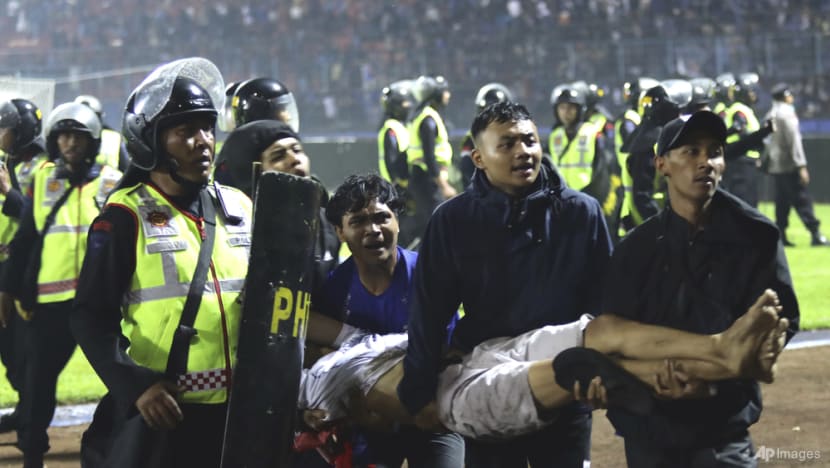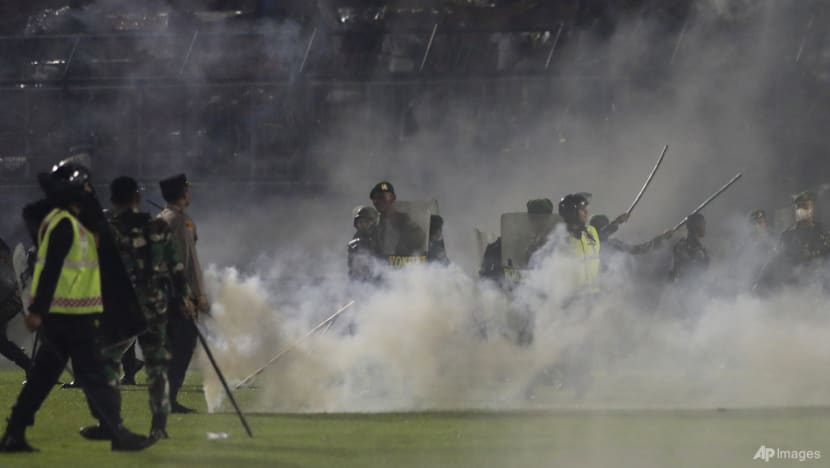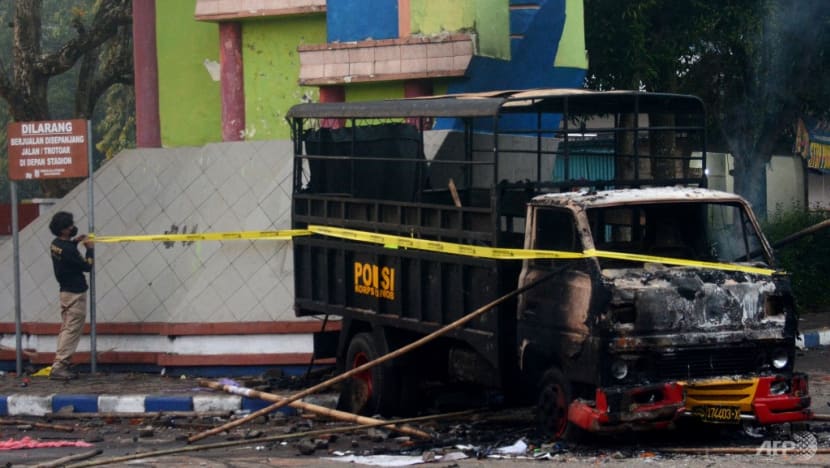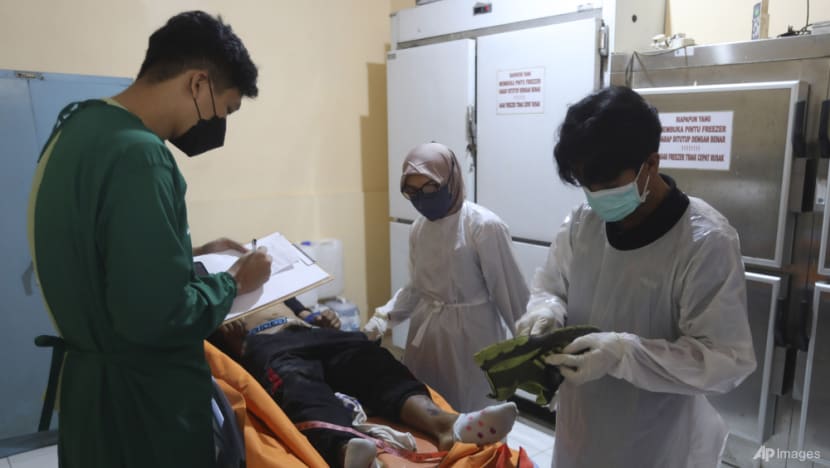Indonesia’s deadly football stampede: What we know so far

JAKARTA: After their team lost 2-3 on home ground to bitter rival Persebaya on Saturday evening (Oct 1), hundreds of spectators believed to be fans of Arema – the beloved football club of Malang City, Indonesia – rushed to the pitch to vent their disappointment.
Police and military personnel guarding the Kanjuruhan Stadium then responded by firing tear gas canisters both at the crowd on the pitch and the spectators on the stand.
This was despite the standard security protocol set by football’s governing body, FIFA which is against the use of firing tear gas inside stadiums.
There were 42,000 people watching Saturday’s game and all rushed to flee the cloud of irritating smoke blanketing the stadium. As a result, 125 people were killed in an ensuing stampede, making it one of the deadliest sports disasters in history.
It is not uncommon for football matches in Indonesia to descend into violence, according to Indonesia’s soccer watchdog, Save Our Soccer, which says that 78 people have died in game-related incidents over the past 28 years.
However, what happened on Saturday was a sporting disaster of such scale that Indonesia had not seen before.
Indonesian President Joko Widodo on Sunday instructed a full investigation into the incident. The president also ordered upcoming matches in Indonesia’s first division football league, Liga 1, to be suspended until an evaluation of security at sporting matches is conducted.
Some Indonesians were quick to blame the police’s mishandling of the situation while others said unruly fans also contributed to the disaster.
But what exactly happened during the match? And what is being done to prevent future incidents and loss of lives, particularly with Indonesia set to host the Under-20 World Cup next year?
HOW IT WENT DOWN
Arema and Persebaya, the football club of Surabaya City which is just a two-hour drive from Malang, are bitter rivals. Fans of Arema, known as “Aremania”, and those of Persebaya, known as “Bonek” often engaged in brawls with one another.
Armed with this information, the Malang Police requested the Indonesian Football Association (PSSI) and the league’s organiser, PT Liga Indonesia Baru (LIB), to stage the match in the afternoon instead of 8pm for security reasons.
PSSI’s secretary general, Yunus Nusi told reporters on Sunday that the proposal was rejected adding that as a compromise Persebaya fans were barred from attending the match.
“That is the reason the organisers and LIB (rejected the proposal). The likelihood of a brawl was small … because there would be no Persebaya supporters coming to Malang,” Mr Nusi told Indonesian media during a press conference at the association’s office in Jakarta.
Arema had never lost to Persebaya on home soil for 23 years, which is why Aremania was devastated by the 2-3 defeat.
When the final whistle was blown at 10.30pm, fans were booing and throwing bottles at the outgoing Persebaya players. Meanwhile, a handful of fans climbed the fence, descended onto the pitch and were seen running and shouting at Arema players.
WHY POLICE USED TEAR GAS
Security officials tried to chase them away which prompted more fans to descend onto the pitch. Within minutes, some 3,000 spectators had swarmed the pitch, according to a police estimate.
This prompted police officers to fire tear gas canisters both at the pitch to disperse the crowd as well as at the stand to prevent more fans from climbing the fence.

Article 19 of FIFA’s Stadium Safety and Security Regulation barred police or the game’s stewards from using firearms and “crowd control gas” to maintain public order. But East Java police chief, Nico Afinta defended its use, saying that it was according to police protocol.
The shooting of tear gas canisters “was done as preventive and diversion methods, so that they didn’t enter the pitch or chase players. (Fans) were assaulting officers and damaged (police) cars and we ultimately had to fire tear gas,” the provincial police chief told reporters on Sunday.
But experts and activists questioned the move saying that while tear gas might be effective in dispersing rioters in an outdoor setting, its use could cause panic in an enclosed stadium.
“The deaths occurred after police use of tear gas on the crowd resulted in a stampede at the stadium exits. Tear gas should also never be fired in confined spaces,” Usman Hamid, executive director of Amnesty International Indonesia, said in a statement.
Mr Hamid also called for the officers involved to be prosecuted. “This loss of life cannot go unanswered,” he said.
The 1964 football disaster in Lima, Peru which killed 328 people was also prompted by the firing of tear gas as did the 2001 disaster in Accra, Ghana which killed 126 people.
National Police chief Listyo Sigit Prabowo said police have launched an internal inquiry to review police handling of the situation.
“We have already collected data from the crime scene. What is clear is that we will seriously investigate to the very end,” he said on Sunday.
DID THE SECURITY PERSONNEL ACT EXCESSIVELY?
Speaking at a press conference on Monday, Indonesian military chief Andika Perkasa admitted that some military personnel responsible for securing the match had acted excessively by hitting fans who were already retreating or lying helpless on the ground.
“For me, this is a criminal act. We will not (impose) disciplinary sanctions but (launch a) criminal (prosecution). Because (their actions) were excessive,” he said.
Police had not made a similar pledge saying that the decision to punish the officers involved in the incident depends on the outcome of its investigation.
National Police spokesman Dedi Prasetyo said police are currently investigating the crime scene including examining footage taken by the stadium’s surveillance cameras.
Police, he said, will also question officials from the league, the provincial chapter of the PSSI, Arema and the province’s Youth and Sports Agency.
Mr Prasetyo added that police have also questioned 18 police officers who were involved in securing the match as part of its internal investigation.
On Monday, police announced that they have suspended 10 officials including chief of the Malang City police, Ferli Hidayat. 9 others were field commanders in the match.
INDEPENDENT FACT-FINDING TEAM
Coordinating Minister for Politics, Legal and Security, Mohammad Mahfud said overcapacity might also be to blame.
“The number of spectators should be based on the stadium’s capacity, which is 38,000 people. But the organiser did not do this ... The ticket sold was 42,000,” he told local media on Sunday.
Mr Mahfud announced on Monday that the government is forming an independent fact-finding team comprising senior government officials, representatives of football clubs and associations as well as academics and the media to determine what happened at Kanjuruhan Stadium.
The team will be led by Mr Mahfud with Youth and Sports Minister Zainuddin Amali serving as vice chairman. It is also made up of a former football athlete, a sports journalist, an activist, two academics and several former government officials.
The team is expected to complete its fact-finding task and make recommendations in two or three weeks' time.
“Police are asked to immediately identify the culprits over the next few days and to conduct an evaluation on how security is handled in their respective areas,” said Mr Mahfud told a press conference at his office in Jakarta.
He also announced that the government has agreed for compensation to be made to the families of the victims.
"Although the loss of lives cannot be valued in money, but the president is willing to provide compensation of Rp 50 million (US$3,268) for each deceased victim. We will soon do it. We just need to verify administrative data with the local government and so on," he said.

The government is also urging PSSI to make a similar evaluation and act accordingly.
Mr Mahfud also said that the government will foot all of the victims' medical expenses and is considering compensation for them.
He said that the type and form of the compensation will be determined over the next one or two days.
PSSI chairman Mochamad Iriawan said the association has decided to suspend Liga 1 matches indefinitely as the body evaluates its safety and security procedures. Arema is also barred from staging home matches for the remainder of the season. Arema still has 23 more matches.
“We would like to apologise to the victims' families and all the others affected. PSSI is making an evaluation so that incidents like this will not happen again,” he said in a statement on Monday.
"DARK DAY FOR ALL INVOLVED IN FOOTBALL": FIFA
Meanwhile, football fans across the country agreed to set aside their differences and rivalries in a show of solidarity with the victims of the incident. On Sunday, vigils were staged in several cities by fans of their respective football clubs, including Persebaya fans in Surabaya.

Football stadiums across the world also observed a minute of silence for the fallen Arema fans on Sunday, while FIFA headquarters in Zurich flew flags of its member countries at half-mast in a show of respect.
“This is a dark day for all involved in football and a tragedy beyond comprehension,” FIFA President Gianni Infantino said in a statement.
FIFA had not issued a statement on whether it will impose any sanctions on Indonesian football, including what would happen to Indonesia’s plan to host the Under 20 World Cup next year.
However, PSSI secretary general Nusi said the football governing body had requested PSSI to submit a report on what happened and the outcome of the police's ongoing investigation.
















